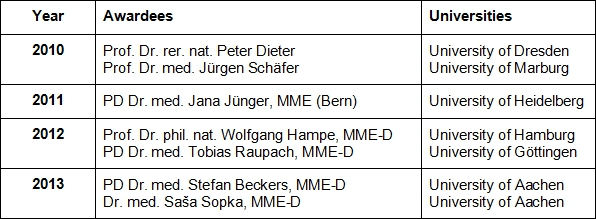[The Ars legendi-faculty award for excellent teaching in medicine: honour and career stepping stone]
Sigrid Harendza 11 University Hospital Hamburg-Eppendorf, III. Department of Internal Medicine, Hamburg, Germany
Appreciation of teaching
Since 2006 the Donors’ Association of the Promotion of Humanities and Sciences in Germany awards the “Ars legendi award for excellent academic teaching” every year in a different faculty to honour the outstanding performance of an academic teacher in “establishing the quality of teaching as a fundamental criterion of excellence at universities” [

The “Ars legendi-faculty award for excellent teaching in medicine” has its specific place within the framework of prices for improvement of the quality of teaching. In recent years, so called “Teacher of the Year” awards have been established at many medical faculties in Germany, Austria, and Switzerland, which are awarded for the most part based on teacher evaluation by students. A study from Canada, where such faculty awards have been established for quite some time, shows that 45% of the recipients of such awards feel inspired to further enhance the quality of their teaching while department chairs largely regarded such awards mainly as prestigious for their departments rather than for the quality of teaching [1]. A recently published meta-analysis from the US on faculty awards for exemplary teaching identified the following main aspects [2]:
- Institutional attitudes influence the perception how excellent teaching is valued, fostered, and recognized.
- Teaching awards can have unintended negative consequences if recipients feel isolated and excluded from sharing their teaching expertise with others.
- When teaching awards are used for promotion, the alignment of promotion criteria with award criteria should be observed.
Furthermore, beyond internal faculty awards different teaching awards for universities are established within certain states or within different scientific associations in Germany [
The “Ars legendi-faculty award for excellent teaching in medicine” is award based on criteria which take qualitative commitment in individual teaching as well as achievements in general curricular and faculty development into consideration for evaluation of teaching quality. Therefore, individuals whose life time achievements in the field of teaching are honoured as well as individuals from the so called mid-level faculty whose university careers are still to be developed. In the laudations for the awardees the following special foci for their individual work were emphasized: the initiation of the use of digital media at many sites by innovative concepts (Jürgen Schäfer), the development of an interdisciplinary and practice-oriented reform curriculum (Peter Dieter), the implementation of communication training and the establishment of a centre of excellence for assessment in medicine (Jana Jünger), the improvement of the selection procedures for medical students (Wolfgang Hampe), the multi-disciplinary bracing of the areas clinical work and educational research (Tobias Raupach), and finally the establishment of an interdisciplinary centre for skills training in medical education (Stefan Beckers und Saša Sopka).
With one exemption all awardees of the “Ars legendi-faculty award for excellent teaching in medicine” are members of the Society of Medical Education (GMA) and are engaged in its committees. Most of them have completed postgraduate Master of Medical Education (MME) studies [
Competing interests
The author declares that she has no competing interests.
References
[1] Brawer J, Steinert Y, St-Cyr J, Watters K, Wood-Dauphinee S. The significance and impact of a faculty teaching award: disparate perceptions of department chairs and award recipients. Med Teach. 2006;28(7):614-617. DOI: 10.1080/01421590600878051[2] Huggett KN, Greenberg RB, Rao D, Richards B, Chauvin SW, Fulton TB, Kalishman S, Littlefield J, Perkowski L, Robins L, Simpson D. the design and utility of institutional teaching awards: a literature review. Med Teach. 2012;34(11):907-919. DOI: 10.3109/0142159X.2012.731102
[3] Breuer G. Thieme Teaching Award – How useful is a "leap of faith"? Anasthesiol Intensivmed Notfallmed Schmerzther. 2012;47(7-8):502-503.
[4] Rupp I. Award for best continuing medical education article: Springer CME award Der Internist presented for the ninth time. Internist. 2013;54(5):581-582 DOI: 10.1007/s00108-013-3268-x
[5] De Stasio EA. The 2013 Genetics Society of America Elizabeth W. Jones award for excellence in education: A. Malcolm Campbell. Genetics. 2013;194(1):11-13.
[6] Tollefson N, Tracy DB. Comparison of self-reported teaching behaviors of award-winning and non-award winning university faculty. Percept Mot Skills. 1983;56(1):39-44. DOI: 10.2466/pms.1983.56.1.39




